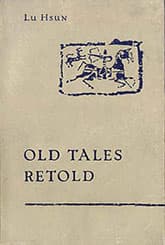Old Tales Retold
Critique • Quotes
 1972 Peking edition
1972 Peking editionFirst publication
1935
Literature form
Story collection
Genres
Literary
Writing language
Chinese
Author's country
China
Length
Approx. 40,000 words
Facetious fantasy
Either of the two other major story collections published during Lu Hsun's life—Wandering or Call to Arms— could have been chosen to spotlight. They're all great. But the most important piece in those two volumes, The True Story of Ah Q, has already been discussed. Lu Hsun's final collection, Old Tales Retold, gives us something very different, if not new, to consider.
This is a volume of Chinese fables rewritten from a new perspective—namely the perspective of a twentieth-century revolutionary who considers the ancient morality tales to be outdated and destructive for a modern audience.
In the "Preface" (Lu Hsun's prefaces are always highlights of his books), the author says it took him him thirteen years to recast these eight stories to his satisfaction. He admits he did not always follow the old storylines and often gave free rein to his imagination. "And having less respect for the ancients than for my contemporaries," he says, "I have not always been able to avoid facetiousness."
Mocking fairy tales
Unfortunately the facetiousness—or satire, to use a nicer word—is difficult to pick up if one does not know the original stories that are being revamped. Still some of the tales are a hoot. For instance, my favourite "Forging the Swords" begins with a realistic enough scene of a boy confronting one of the rats that keeps him awake at night, but moves on through increasingly fabulous events as the boy is sent by his mother to avenge his father's death by assassinating the king with a specially forged sword, to climax in a bizarre fight of three bodiless heads in a boiling cauldron.
I'm not sure of the political import of the tale but it assuredly mocks all those fairy tales that glorify monarchies.
"The Flight to the Moon" is apparently a take-off on ancient legends of an heroic archer and his wife who drank an immortality potion and flew to the moon to become a goddess there. In Lu Hsun's version Yi is failing to find prey to satisfy his wife's appetite, engages in battle with a former student (with a trick conclusion) and tries to shoot the moon down after his wife disappears.
"Resurrecting the Dead" is written in the form of a drama. It makes great fun of the Taoist philosopher Chuang Tzu who is famous for having once dreamed he was a butterfly but, upon waking, no longer knew if he was a butterfly dreaming he was a man or a man who had dreamed he was a butterfly. He also wrote about the equivalence of life and death, right and wrong, and other opposites, the realization of which supposedly leads a thinker to disdain all judgment.
In Lu Hsun's story, Chuang Tzu summons unearthly powers to bring back to life a man who has been dead five centuries and who promptly calls a policeman to charge Chuang Tzu with robbing him.
These and the other stories in Old Tales Retold take some getting used to, especially for their uneasy mix of social realism an fantasy. But if you take the time to familiarize yourself with Lu Hsun's world, you may find them fresh, clever and quite entertaining.
— Eric
Critique • Quotes

